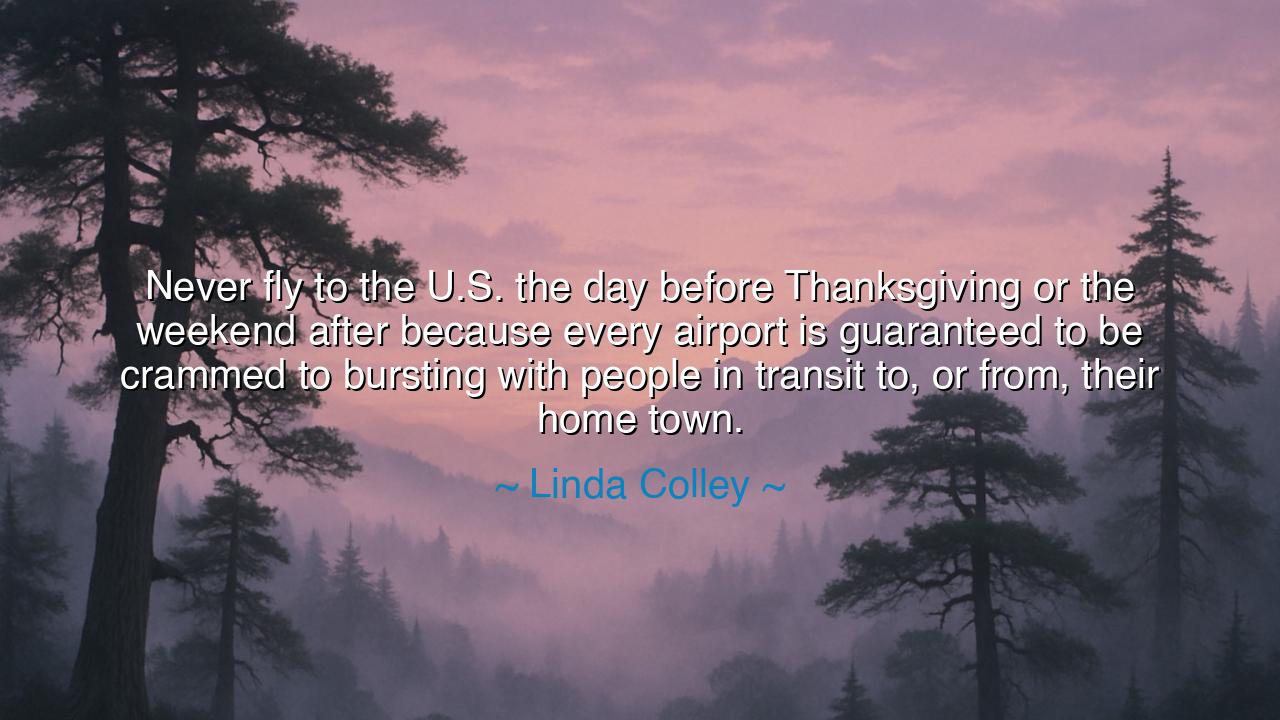
Never fly to the U.S. the day before Thanksgiving or the weekend
Never fly to the U.S. the day before Thanksgiving or the weekend after because every airport is guaranteed to be crammed to bursting with people in transit to, or from, their home town.






Linda Colley, with the precision of an historian and the eye of a traveler, once offered a practical yet profound counsel: “Never fly to the U.S. the day before Thanksgiving or the weekend after because every airport is guaranteed to be crammed to bursting with people in transit to, or from, their home town.” At first, her words appear as mere travel advice, but beneath them rests a timeless lesson about tradition, longing, and the unbreakable pull of family and belonging.
The essence of her saying is that Thanksgiving is not merely a holiday, but a pilgrimage. Millions journey across the nation, enduring long lines, crowded spaces, and weariness of travel, all for the sake of sitting at the family table once more. The crowded airports are but a symbol of something deeper—the desire of the human heart to return home, to reconnect with loved ones, and to root itself again in the soil of memory and tradition. In this way, the chaos of travel becomes a testimony to the enduring power of family bonds.
History itself is filled with such great migrations of the heart. Think of the Roman festivals, when citizens returned from distant provinces to gather in the capital, filling the roads with carts and crowds. Or recall the great homecomings of soldiers after war, when railway stations swelled with tears, embraces, and overflowing humanity. In every culture, journeys home for sacred days have always meant crowded pathways. Colley’s words echo this universal rhythm: where love and duty call, the roads and skies will always be full.
There is also irony in her counsel. She warns against travel during these days not because the journey is unworthy, but because the very beauty of homecoming creates its own burden. The airports “crammed to bursting” reveal the paradox of modern life: technology allows swift travel, yet the more people are able to return, the greater the strain upon the system. What was once a quiet feast of villages has become the greatest annual migration in America. The inconvenience, though heavy, is also proof of how fiercely people guard the tradition of returning home.
Her words also speak of the sacrifice hidden within love. Those who brave the crowded airports, who wait in long security lines or endure delays, reveal that family is worth the hardship. The traveler might grow weary, but the moment of arrival—the warm embrace, the shared meal, the laughter across the table—redeems the chaos of the journey. In this, Colley reminds us that inconvenience is often the price of connection, and that the most important destinations require endurance.
The lesson for generations is both practical and spiritual. Yes, heed her warning: avoid the busiest days if you seek peace in your travels. But more importantly, understand why the crowds gather. It is because human beings are bound by love, memory, and tradition. If you must join the throng, do so with patience, remembering that you are part of something greater—the great river of humanity flowing home to its source.
Therefore, let Linda Colley’s words endure as wisdom: Thanksgiving travel is not merely about planes and airports, but about the timeless longing for family and belonging. The journey may be crowded, the paths inconvenient, but the destination is holy. And whether you travel early, late, or not at all, let your heart remain fixed on the true meaning of the season—not the struggle of the journey, but the joy of being home.






AAdministratorAdministrator
Welcome, honored guests. Please leave a comment, we will respond soon